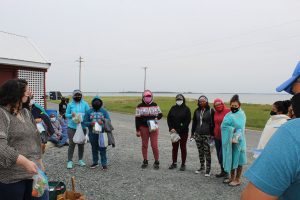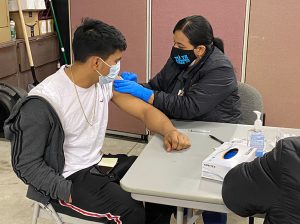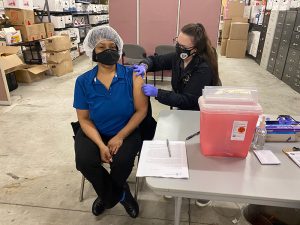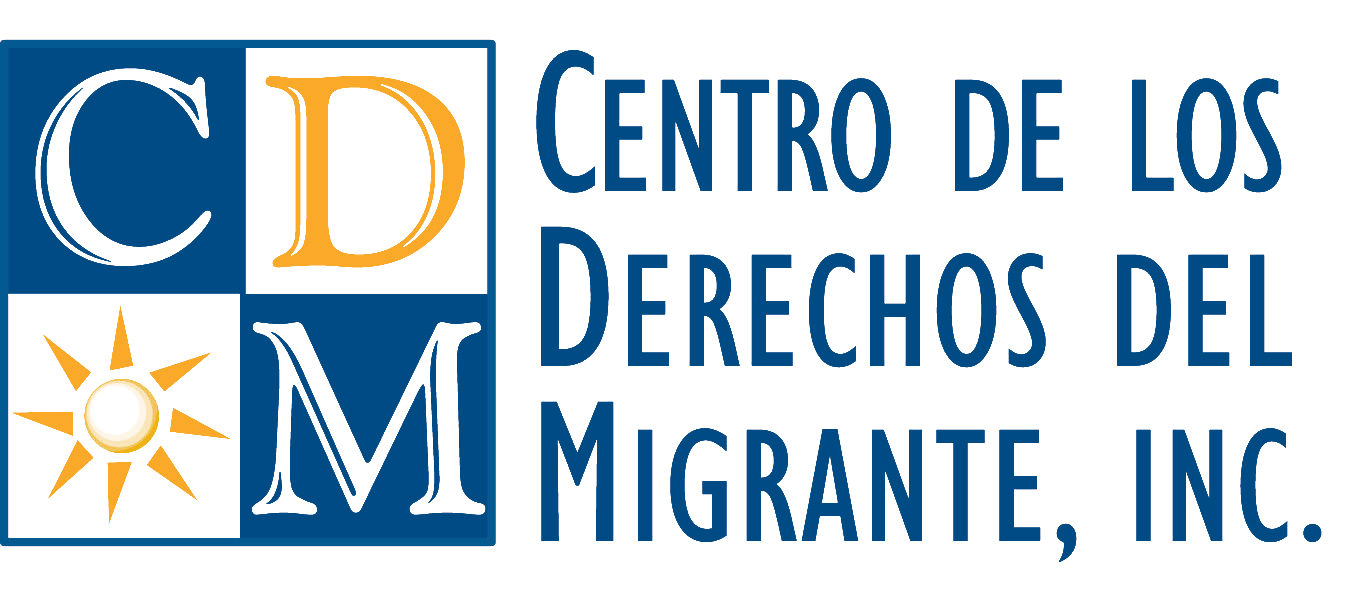This Workers’ Memorial Day, in honor of workers who have been killed or injured on the job, we’re announcing CDM’s Protein Processing Worker Project. Through a cooperative agreement with the CDC, this project seeks to prevent infectious diseases among workers in protein (seafood, meat and poultry) processing industries in the Delmarva region.
As part of this project, CDM launched a coordinated campaign, including in-person and digital outreach via Contratados.org. We’re so proud to be working alongside our allies at Comité de Apoyo a los Trabajadores Agrícolas (CATA), Legal Aid Justice Center, Rebirth, Inc., Migrant Clinicians Network and the United Food and Commercial Workers Union (UFCW) Local 27.
Check out our press release below!

CDC Expands Partnership with Migrant Workers’ Rights Organization on COVID-19 Campaign
Coordinated Outreach Campaign Aims to Prevent Infectious Diseases among Workers in Protein Processing Industries
BALTIMORE, MD – Centro de los Derechos del Migrante (CDM), a binational migrant rights organization based in the U.S. and Mexico, and the Centers for Disease Control and Prevention (CDC) have signed a five-year cooperative agreement to prevent and control infectious disease among migrant workers in protein (meat/poultry/seafood) processing industries. In its first year, the demonstration phase of the project aims to reach up to 19,000 workers in the Delmarva region (encompassing areas of Delaware, Maryland and Virginia) with guidance and best practices on disease prevention. The project will also support workers’ understanding of their rights and responsibilities relating to workplace health and safety. The initial effort is funded by a $1.7 million grant and will also provide data to the CDC to inform new guidelines and best practices, including vaccination strategies.
Workers in the U.S. protein industry, many of them migrant workers, have limited access to basic services, including healthcare. In December of 2020, the CDC’s Morbidity and Mortality Weekly Report (MMWR) reported that foreign-born workers at meat and poultry processing facilities including in Maryland are especially vulnerable to SARS CoV-2 infection due in part to communications barriers and public health hazards at work and in the community. The study further recommended that partnership with community-based organizations and labor groups “to disseminate culturally and linguistically tailored messages about risk reduction behaviors” could make a difference in workers’ health outcomes.
As part of this grant, CDM is coordinating a regional network of organizations, including el Comité de Apoyo a los Trabajadores Agrícolas (CATA), Legal Aid Justice Center, Rebirth, Inc. and UFCW Local 27. The Migrant Clinicians Network is providing technical assistance to the project.

“Through our 15 years supporting migrant workers, we know that coalition-building should be at the heart of any effective crisis response,” said Rachel Micah-Jones, Founder and Executive Director of CDM. “Collaboration is essential, and we’re partnered with incredible allies with deep relationships with worker communities. This grant will strengthen these partnerships to improve health conditions for workers during the pandemic. The increase in COVID cases and changes in vaccination efforts heighten the importance of this campaign. We look forward to leveraging the CDC and our partners’ expertise in order to provide reliable information to workers across the U.S.”
Migrant workers who have contacted CDM during the pandemic report going to work while showing COVID-19 symptoms for fear of not receiving pay, even if it meant exposing their colleagues to infection. While most workers’ first language is Spanish, an increasing number speak indigenous languages such as Mixtec and Nahuatl, complicating public health outreach.

“Tailoring information to workers’ needs is critical to successfully suppressing outbreaks and coordinating vaccination efforts,” said Julia Coburn, CDM’s Project Director. “Creating multilingual content cross print and digital resources is part of the equation, but it also requires tapping into existing communication channels that can reach workers with the right information at the right time. The trust CDM and our partner organizations have built over the years with migrant worker communities is critical to these efforts.”
Alongside project partners, CDM has leveraged a wide range of tactics in the information campaign, including distributing printed materials and sharing information digitally via Facebook, WhatsApp and Contratados.org — the organization’s migrant worker platform. As part of the grant, Contratados.org will be equipped with an automated chatbot, giving workers 24/7 access to advice, guidance and emergency support free from employer surveillance and intimidation.
“This collaborative agreement enhances CDC’s capacity to better serve and reach a truly multi-lingual and culturally diverse group of essential workers by integrating CDM and their partners into the national pandemic response already underway,” said Kevin Chatham-Stephens, Lead for CDC’s COVID-19 Response Health Systems and Worker Safety Task Force. “The partnership allows CDC to use its existing relationships with organizations and workers, and its linguistic and cultural skills, to better create and disseminate safety information to those who need it, increase the number of workers willing to adopt actions that will keep them healthy and safe, and respond to unique emergency situations affecting this diverse workforce.”
According to Michael Flynn, CDC Technical Lead for the project, “Early results of this partnership include the formation of multi-stakeholder regional network; distribution of PPE and informational materials to hundreds of protein processing workers in DE-MD-VA; multilingual social media and radio-based outreach achieving hundreds of thousands of followers engagements; and the launch of a multilingual #covidchat campaign centering CDC guidance on COVID-19 vaccination.”
Statements of support from partners:
“The Migrant Clinicians Network is pleased to be a partner in this important initiative aimed at preventing COVID-19 among a largely immigrant workforce who labor tirelessly to keep food on our tables and who are at the heart of Delmarva’s chicken and crab industries,” said Amy Liebman, who directs the Migrant Clinicians Network’s East Region Office. “For over three decades, MCN has focused on the occupational health disparities of migrant and immigrant workers and their families. We bring to this project our expertise in worker health and safety and assessing the impact to targeted interventions. We look forward to helping this project showcase the immediate and lasting impact that this important initiative will have on the lives of workers and their communities.”
“Workers in the protein processing industry have been deeply impacted by the COVID-19 pandemic and despite a lot of attention nationwide, have seen few improvements in their workplaces to provide meaningful protections to their health and safety. Now, as the vaccine begins to roll out, there is even less focus on the precautions needed,” said Jessica Culley at CATA. “As an organization that strives to give workers the tools they need to stand up for their rights, we are excited to join with other organizations to work to ensure that workers have reliable, accurate information on their rights and the services available to them. We hope that this will help to create real and meaningful protections of their well-being.”
Cecilia Hernández, community organizer at Legal Aid Justice Center: “As an organization that is deeply engaged with essential workers in poultry, seafood and agriculture industries, LAJC understands the risks that these communities face when claiming their rights. We also understand the value of collaborating with organizations that share common concerns and goals to support these workers, particularly in the midst of a pandemic. Now, more than ever, we must stand in unity to ensure that workers can safeguard themselves and their communities around them by accessing the vaccine and other health protections.”
Habacuc Petion, Founder and Executive Director of Rebirth stated: “Rebirth’s mission is to advocate for the rights and facilitate resources for the low income and immigrant workers in our community. Throughout the COVID-19 pandemic, our organization has been providing health, safety and workers’ rights training and outreach to many workers and community members. Unfortunately, Haitian workers in particular continue to face challenges to accessing vaccines and accurate information about their options. Employers have not been supportive, and misinformation is rampant at all levels. We welcome the opportunity to join forces on this project as a partner and a collaborator at this critical time.”
Javiel Nazario from UFCW Local 27 said: “To put an end to this pandemic, we must work together. All of us – from our union members on the frontlines, to regulators tasked with ensuring their safety, to our families, friends, and community partners. We all have a role to play to save lives and prevent the spread of infectious diseases, COVID-19, and address workplace issues. Local 27 welcomes this opportunity to be a part of the Protein worker project and looks forward to working with CDM and all the partners to address the safety concerns facing our members.”
About Centro de los Derechos del Migrante, Inc. (CDM)
Centro de los Derechos del Migrante, Inc. (CDM) envisions a world where migrant workers’ rights are respected, and laws and policies reflect their voices. Through education, outreach, and leadership development; intake, evaluation, and referral services; litigation support and direct representation; and policy advocacy; CDM empowers migrant workers to defend and protect their rights as they move between their home communities and their workplaces in the United States. www.cdmigrante.org

